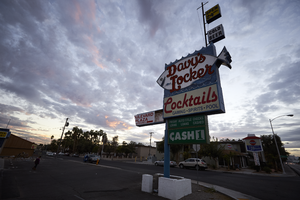Search the Special Collections and Archives Portal
Search Results
University of Nevada, Las Vegas Photograph Collection
Identifier
Abstract
The University of Nevada, Las Vegas Photograph Collection (approximately 1900-2004) depicts the development of the university and the city of Las Vegas. The collection includes images of campus buildings, student activities, sports teams, past university presidents, and Las Vegas in the early twentieth century. Early images depicting the surrounding area are included in this collection as well.
Archival Collection
Senator Chic Hecht Political Papers
Identifier
Abstract
The Senator Chic Hecht Political Papers (1943-1988) contain the political papers of United States Senator and Las Vegas, Nevada businessman Chic Hecht. The bulk of the collection contains legislation, notes, correspondence between Hecht and constituents and other members of Congress, and speeches from Senator Hecht's term in the Senate from 1982 to 1988. Also included are files on civil service, the federal budget, education, labor, transportation, land management, foreign policy, public health, and trade.
Archival Collection
Liberty Engine Company No. 1 Records
Identifier
Abstract
The Liberty Engine Company No. 1 Records (1876-1927) consist of two accounting ledgers belonging to the Liberty Engine Company No. 1, the fifth volunteer fire company formed in Gold Hill, Nevada in 1868. One ledger is signed by a the wife of J. H. (John H.) Witte, who was listed in an 1880 edition of the Gold Hill Daily News as a member of the Liberty Engine Company No. 1. The collection also contains banking transactions dating from 1926 to 1927 and a handwritten account of various payments made to the heirs of a Mrs. S. K. Witte in 1906. Some items in this collection are digital surrogates.
Archival Collection
James Cashman Sr. Photograph Collection
Identifier
Abstract
The James Cashman Sr. Photograph Collection (approximately 1905 to 1975) consists of black-and-white photographic prints, negatives, slides, and albums as well as a glass plate negative. The photographs depict four major subjects: Cashman's family, friends, and associates; Cashman's businesses; the Hoover Dam and Colorado River; and various locations across Nevada.
Archival Collection
Tom Hawley Papers
Identifier
Abstract
The Tom Hawley Papers (approximately 1955-2019) contain the personal papers of Las Vegas, Nevada based traffic and transportation reporter, Tom Hawley. The collection primarily includes physical and digital materials that represent Hawley's interests in Las Vegas history; transportation issues in the Las Vegas Valley, including the Las Vegas Monorail and Resort Corridor Project; and his work as a traffic and transportation reporter for KSNV Channel 3. Materials from KSNV include video clips and transcripts of
Archival Collection

Photographs of Davy's Locker sign, Las Vegas (Nev.), November 20, 2016
Date
Archival Collection
Description
Site address: 1149 E Desert Inn Rd
Sign owner: Was Cindy Slight since 2010. Albert Hamika bought the property in 2016. Derek Stonebarger went to the property after they took the sign down and the fish portion of the sign is currently in his possession.
Sign details: The property was originally opened in 1968 by Davey Pearl, who was most known for being a boxing referee and later inducted to the World Boxing Hall of Fame. The actual opening date of the bar is unknown, but property records have shown that its building was constructed in 1968. The bar was known for the welcoming environment inside and inexpensive drinks. The sign itself drew people in because of its unique design. Right before their closure they started to have a variety of events taking place there such as: open mic night, trivia, and genre specific music nights. The current owners have demolished the iconic and beloved sign for the bar. The only portions that remain are white sign that reads "Cocktails" in red and the waves that the fish once "swam" above. The current owner of the property has told the Las Vegas Weekly, "I want to emphasize I wasn't like, 'Ok let's destroy this sign.' I like the sign, and I like the historic memorabilia"I tried. The only thing I can I can say is, it was time for it to come down." After hearing about this news Derek Stonebarger, who owns ReBar on Main Street, was distraught when he heard the news of the sign being taken down so he went to the property to find its remains. He hopes to restore as much of the sign as he can and possibly display it in a Nevada-themed restaurant he plans to open up.
Sign condition: Since the sign has been taken down it is a 0.
Sign form: Roadside pole sign
Sign-specific description: This sign was designed to look like a fish was swimming in the ocean. The top of the sign give the appearance of waves. A neon tube was attached to the implied waves. Underneath this was a large, white fish whose tail and nose extended beyond the confines of the square shape of the sign. The fish appeared to have a large smile and two smaller fish "swimming" beside it. One of these smaller fish was near the larger fish's mouth and the "L." The other fish was located right under the "ker" in "Locker." Both of these fish were a light blue color, the same blue that matched the wave on top of the sign and surrounded the larger fish. In the middle of the large fish that makes up much of the sign were the words "Davy's Locker" in bright red and an elaborate cursive style font. Neon tubes outlined these letters, as well as all three fish included in the sign. Underneath all of this is a neon tube in the shape of a wave that is difficult to see in photos of the sign during the day, but glowed brightly at night. Below this signage was a back lit plastic sign reading "Cocktails" in a red script and "Gaming Spirits Pool" under that in a sans-serif, bold, dark blue font. Extending from the top of the sign at the end near the street was a pole with two, small square signs attached to that. The top one was yellow and read "OPEN 24 HRS." The one below that was white and read "COLD BEER." There are other photos of this sign where the plastic portion of the sign reads "COCKTAILS" in red still, but "Slots Video Poker" in blue and "Package Liquor" under that in red.
Sign - type of display: Neon and backlit plastic sign
Sign - media: Steel and plastic
Sign - non-neon treatments: Plastic backlit portion
Sign environment: The surrounding environment of Davy's Locker was in a district that was close to UNLV as well as another popular bar that still caters to locals, Champagnes Cafe. It was located in a bustling area along to Maryland Parkway that locals travel on a daily basis. Davy's Locker was a popular watering hole for many people in the neighborhood due to its convenient location.
Sign - date of installation: Around the 1960's
Sign - date of redesign/move: It was first restored in 2011 and another time in 2014. Sign was taken down from the property in 2017.
Sign - thematic influences: The theme of the sign appears to take inspiration from the phrase "Davy Jones' Locker." This is a common phrase that refers to "the bottom of the sea" or even "the mythical resting place of drowned mariners." Davy Jones is also believed to be an evil spirit from the bottom of the sea; therefore, the sign shows the influence of these aquatic origins that possibly inspired the name of the property.
Sign - artistic significance: The theme of the sign is aquatic, which also ties into the name of the property. The name of the property appears to take influence from the myth of Davy Jones, the evil spirit of the sea.
Survey - research locations: Las Vegas weekly articles https://lasvegasweekly.com/as-we-see-it/2016/mar/23/beloved-dive-bar-davys-locker-sold-old-vegas/ https://lasvegasweekly.com/intersection/2017/jan/11/davys-locker-neon-sign-demolished/ https://lasvegasweekly.com/intersection/2017/jan/13/davys-locker-bar-neon-sign-recovered-stonebarger/ , Las Vegas Sun article https://vegasinc.lasvegassun.com/business/2016/mar/25/popular-dive-bar-to-take-a-breather-while-sports-b/ , Roadside Architecture http://www.roadarch.com/signs/nvvegas3.html , Phrase website http://www.phrases.org.uk/meanings/davy-jones-locker.html
Surveyor: Lauren Vaccaro
Survey - date completed: 2017-08-22
Sign keywords: Steel; Plastic; Backlit; Neon; Roadside; Pole sign; Back to back
Mixed Content
Edythe and Lloyd Katz Papers
Identifier
Abstract
The Edythe and Lloyd Katz papers (1934-2002) provide a glimpse of the social, religious, and educational contributions they made to the community of Las Vegas, Nevada. Materials include photographs, correspondence, newspaper clippings, and awards dating from 1934 to 2002.
Archival Collection

Qiong Liu interview, June 8, 2016: transcript
Date
Archival Collection
Description
Interviewed by Claytee White. Dr. Liu is the City Manager for the City of North Las Vegas. Discusses housing, diversifying the economy, Apex, Faraday and negotiations to secure that business for North LV.
Text

Transcript of interview with Gwen Walker by Claytee White, July 15, 2014
Date
Archival Collection
Description
Gwendolyn K. Walker arrived in North Las Vegas in 1962 from Houston, Texas, as a five-year-old with her parents, two brothers, and her cousins. The Walker family at first moved to a rented house on D Street, and Gwen attended Kit Carson Elementary School for first grade. Her mother enrolled in nursing school, so she sent Gwen back to Delhi, Louisiana, to be raised by her grandmother. In Delhi Gwen picked cotton with her aunt while she was in the second grade. Gwen returned to North Las Vegas to live with her mother and complete elementary school at Jo Mackey before matriculating to J. D. Smith Elementary School for junior high school and then to Clark High School. Later she attended UNLV. Gwen and her mother joined Saint James Catholic Church at H Street and Washington Avenue, but after she returned from Delhi she joined Second Baptist Church, where she became close with a cohort of friends that remained strong even as she experienced racism and bullying and love for the first time.
Text

Transcript of interview with Nancy Cummings-Schmidt by Stefani Evans and Claytee D. White, October 18, 2016
Date
Archival Collection
Description
With the explosive growth of the Las Vegas Valley over the past 30 years, it is rare to find someone who has deep battle born roots that go back to the early mining days of Nevada. Nancy Cummings-Schmidt is an example of that rare kind of gem. As a fourth generation Nevadan, her family came to the state in the 1800s form Ireland and England. Looking to capitalize off of the mining boom in Virginia City, they transitioned to ranching. She spent her first years in Reno and when her father went off to fight in the Second World War, her mother moved to Herlong, California and sent her to live with her grandparents. Upon moving to Vegas for fourth grade, her mother remarried and worked for the Las Vegas Sun while Nancy attended the Fifth Street Grammar School and later became a member Las Vegas High School’s first graduating class in 1956. After graduating from high school, Nancy invested in the spirit of wanderlust as it carried her to study theatre at Texas Christian University (which sh
Text
